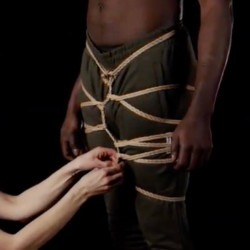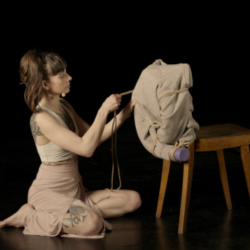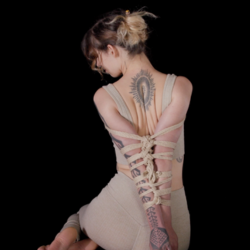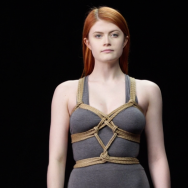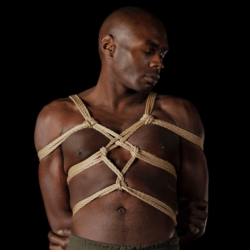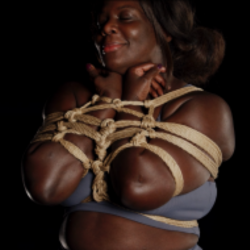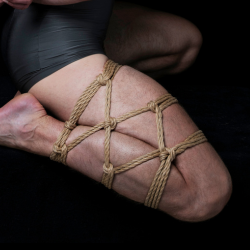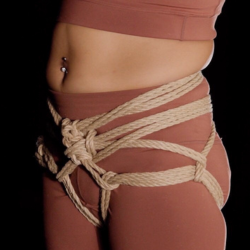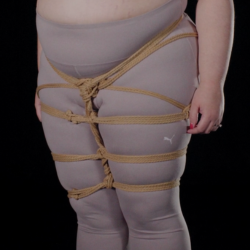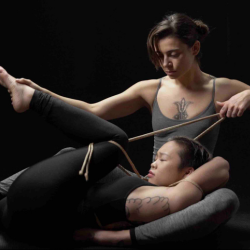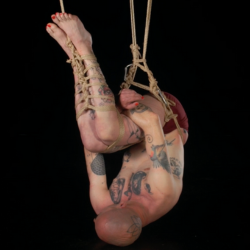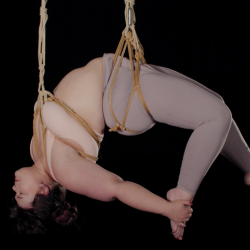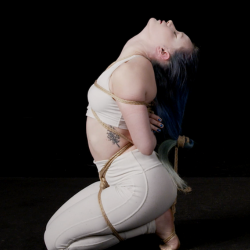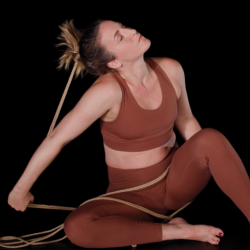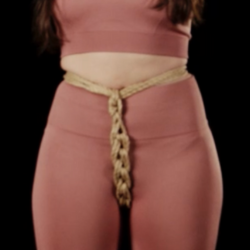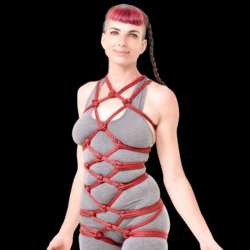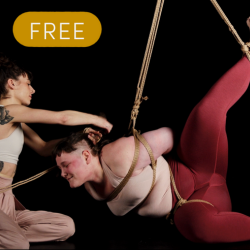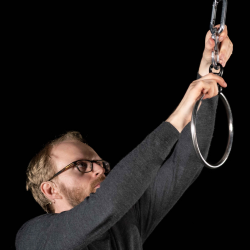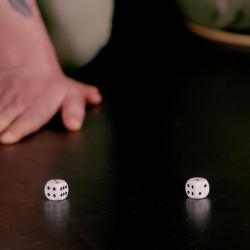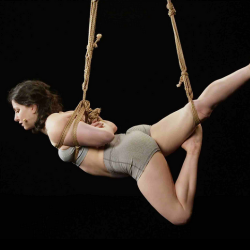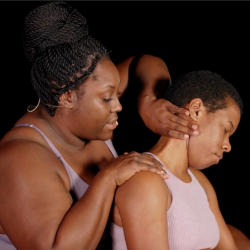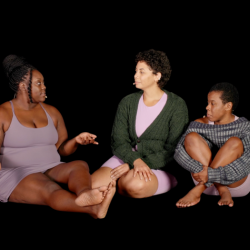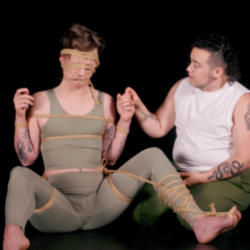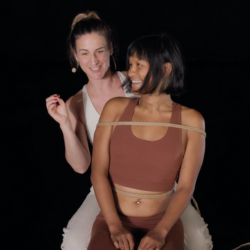EP 47
LOOM
Wren and Loom delve into the complexities of Shibari, exploring Loom's evolution from technical proficiency to prioritizing art and meaningful connection. They discuss the ego death brought on by COVID, and the challenge of balancing artistry with authentic human interaction in rope practice.

LOOM (he/him) is a rope artist, photographer, and educator based in the Pacific Northwest. For him, rope is more than a passion project; it's an all-consuming obsession rooted in artistic expression, intimacy and catharsis.
Over the past seven years, LOOM has presented and performed in many rope spaces and conferences throughout North America. Currently, he actively teaches private lessons at his home studio in Bellingham, WA.
Instagram: @jloomphoto
[00:00:08] Wren Hello to all my guys, gals and non-binary pals. Welcome to the Shibari Study Podcast. I'm your host, Wren. Shibari Study is an online learning resource offering video tutorials for beginners to advanced practitioners. Whether you're brand new to the world of shibari and needing to learn the basics, or a seasoned rigger or rope bottom seeking inspiration to push your practice to new places, there's something for you at shibaristudy.com. Today I'm talking to Loom. Loom uses he/him pronouns, Loom as a rope artist, a photographer, and an educator based in the Pacific Northwest. I've interacted with Loom a lot. He's one of the coolest people. I love his rope. He's been teaching everywhere. You've been in rope for like ten years or something like that? For a while.
[00:00:58] Loom For, yeah, for a while. Since 2014 is when I first started.
[00:01:03] Wren Just an all around really cool person. And I can't wait to talk to you today. How are you?
[00:01:08] Loom I'm doing so good. Thanks for having me, I was completely honored when I got that, that DM into my Instagram. So thank you so much. I'm so happy to be here.
[00:01:19] Wren You have been a very requested guest.
[00:01:22] Loom Oh my goodness, you're going to make me cry.
[00:01:24] Wren No, not yet. That's at the end of the podcast.
[00:01:26] Loom Okay, sweet. I'm here for it.
[00:01:28] Wren Speaking of crying and being emotional, you're a musician.
[00:01:33] Loom I am a, I'm a hobbyist, yeah. I like, I like music a bunch. Anybody that's taken like an intensive or spent any time around me knows that I am completely obsessive about music, so...
[00:01:46] Wren What do you play?
[00:01:48] Loom Well, you know how some people like to pick up an Xbox controller? For me, it's like Appleton. I like electronic music, but I love – there's nothing better than a guitar. Keyboards are fun, samplers are fun, all that.
[00:02:03] Wren What is your go to guitar lick or song or something when you pick up the guitar?
[00:02:09] Loom It's not really, it's not really a lick. It's more like chord structures, like chord progressions. That's what I'm more interested in. And then just riffing from there.
[00:02:18] Wren Do you have specific progressions that you tend to like?
[00:02:23] Loom I like minor chord progressions. I'm, I'm kind of a sad boy like that.
[00:02:28] Wren You are a little bit of a sad boy.
[00:02:31] Loom I am.
[00:02:31] Wren Did you have an emo phase with [00:02:33]the super [0.1s] and all that?
[00:02:34] Loom Heck, yeah. Heck, yeah. No, I had a, I had an older cousin that was so cool –he's not so cool anymore – but he was so cool at the time, and he listened to all the cool bands like The Cure and The Smiths and really, really turned me on to that. And yeah, I think that affected the way I looked as well.
[00:02:55] Wren I love that, I love that. Where did you grow up?
[00:02:59] Loom I grew up kind of all over. My parents were a bit nomadic. But I like to say that the Bay area is home. That's where all my family is now. Well, my parents are in Sacramento now, but. Yeah. So I'd like to say California, but I've lived in Wisconsin, Arizona, Washington.
[00:03:17] Wren You said that you're really nomadic and you traveled around a lot. When did you first experience (…)?
[00:03:24] Loom Organized (…)? Maybe 2014. And definitely there was... I was in a long term relationship at the time, my partner and I went through that seven year itch, and then we discovered Adultfriendfinder. We did the swinger thing for a minute, but that is the wild, wild west of, of things. So we cleared. We quickly realized that maybe that's not our beat. And then, she found Fet and, and... Yeah. And that's how it started.
[00:04:00] Wren And the rest was history.
[00:04:01] Loom Yeah.
[00:04:02] Wren It is funny you bring up swingers of the Wild West. It really is. Not a lot of rules there.
[00:04:10] Loom I'm going to get so much trouble. I just feel it.
[00:04:12] Wren I don't think you – listen. I think everybody knows that, I mean, things happen in those scenes.
[00:04:20] Loom No. And that, I mean, that can be totally fun. I mean, my personal experience with it. There is just, you know, some odd moments that happened and there's like zero accountability. And yeah, that's where organized (…) is so wonderful. Or it can be anyways.
[00:04:35] Wren So your entry point was the swinger community and then you got into organized (…). When did you find rope specifically?
[00:04:45] Loom So my, my long term partner, my wife at the time, she actually pulled up some shibari photos and said, You know what? I think you'd be really good at this. Because we did just, like, a bunch of different, like, DIY crafts and, and I was really into photoshop and manipulating photos and, and and I just like to work with my hands and things of that nature and, and she pulled up a rope lab in the Billingham area, a small little town of 80,000 people, and went to it, and I was instantly hooked. I bought, I bought three hanks of rope that day, and I must tell you that I paid way too much for them. And, and I quickly found out three, three ropes was not enough.
[00:05:33] Wren You needed, you need a couple more.
[00:05:35] Loom Yeah.
[00:05:36] Wren What kind of rope was it? Do you remember?
[00:05:39] Loom It was a local, local rope artist at the time that's no longer around that was making it.
[00:05:47] Wren So you get home, you have your three hanks and you're determined. What was the first thing you did with that rope? Do you remember?
[00:05:56] Loom Are you kidding me? Of course I remember. I even have a picture of it. It's so embarrassing. It was –
[00:06:03] Wren We gotta see.
[00:06:03] Loom It was – maybe, maybe, maybe if you don't make me cry by the end of this podcast, maybe.
[00:06:09] Wren We're gonna get there.
[00:06:11] Loom Yeah, it was, some, some ladder type calf binder thing. It was actually not that bad, but it wasn't that great.
[00:06:18] Wren What was the progression for you getting a full rope kit and eventually doing more intense things and furthering your education? Was there a moment where you realized, Oh, that is a lot I need to learn?
[00:06:32] Loom Yeah, actually, my same partner at the time, she was a huge catalyst. I'm beginning to realize, like, how much of a catalyst she was. She was talking to this, this notorious cat in Vancouver that would throw these really awesome (…) parties and we would go to them and they would have all sorts of things, like human furniture, you know, service oriented things, like [00:07:01](…) [0.0s] individuals serving drinks. But what was really awesome is this person was amazing at curating not only the guests, but people would come and present. So I would see rope artists in, in this person's home. I would see other people that were, like, really proficient at, like (…) and other types of play as well. Even like [00:07:25](…) [0.0s] and things of that nature. But what really turned me on, like, instantly there were two individuals at that time that were both really good at rope for that time period. And then also, were really accomplished photographers outside of (…). And to see, to see those, those individuals not only tie well but also create amazing imagery said to me like, Holy crap, I can, I can do this. Like, this is what I want to do. I want to be in control of the content I create. I also know that I can be, I know if I work hard enough, I can also do good rope. It's just putting in the time and the effort. And so that really... For me and my, for me and my journey, it was, I want to create this imagery, I want to look like I know what the hell I'm doing. So everything has to be the best it can.
[00:08:29] Wren I want to talk about that because you're an amazing photographer. The camera's so polarizing. There's so much there. But before we get into that, I would love to hear more about your progression. One of my issues with social media is that you look at your profile and you don't see any of that progression, and it's easy to think that you just did this overnight. And I'm just guessing, I don't think that that was the case.
[00:09:00] Loom No, no.
[00:09:01] Wren So how did you learn early on?
[00:09:04] Loom Well. Flash forward maybe a year. I met my, my partner. My, my, I was poly at the time and, and it didn't stay that way for very long. But my new, my new partner at that time was just as obsessed with rope as I was, and I that was a huge turning point for me, to have somebody as committed and as committed to rope as I was. Well, it changed everything. And I think that was the catalyst.
[00:09:42] Wren That's so important.
[00:09:44] Loom Oh, it is, it is. And I, and I look back on that and I don't think I would be where I am today without that individual and, and and that journey, during that time.
[00:09:55] Wren I feel the same way. I was lucky to have somebody that was equally obsessed. And that's how we both grew.
[00:10:01] Loom Yeah. And I'm so thankful for that. I'm so thankful for that.
[00:10:05] Wren Yeah. Do you remember any of the initial hardships? Was there something that was really difficult to get past? Be it technical or maybe emotional or conversational or something like that? Is there anything that sticks out?
[00:10:23] Loom As odd as it sounds connecting with another person. That actually came much later in my in my rope journey. I was so worried about being taken seriously and being proficient technically that I never learned how to play, and...
[00:10:42] Wren Being... Being taken seriously by whom?
[00:10:45] Loom Whoever I, whoever I manifested in my head. You know, just the unknown.
[00:10:53] Wren Yep.
[00:10:53] Loom Everyone on the internet.
[00:10:55] Wren I'm smiling so hard right now because this is my exact feelings. I was really into controlling the narrative and presenting the person I wanted to be.
[00:11:08] Loom Exactly.
[00:11:09] Wren I was so, so nervous that I couldn't settle in and play. And I had to learn how to do that.
[00:11:15] Loom Absolutely, absolutely. It's so, it's so silly to say out loud, but I think it's so very important when I talk to people, if someone's taking a lesson from me, I let them know exactly my roots and where I came from and, and how everybody's journey is different. For a lot of individuals, it's tying up their partner and, and having (…) with them. For me, it was rope imagery and being taken seriously by the people that were good at the time or I thought were good at the time.
[00:11:45] Wren There's so much availability and dialogue to be really caught up in the right ways to do rope specifically. It's kind of like food. You can be pretentious about food. There's the dialogue there to form that and you can say things like, I'm a rope purist. In actuality, what that usually – I'm not saying all the time, but usually it means, I don't know how to connect and do other things. And I'm not worried about my partner having fun. I'm worried about the rope and what people are going to think about it, and this lineage of rope that I'm trying to imitate and things like that.
[00:12:22] Loom People are weird.
[00:12:23] Wren They are. You said that a lot of people are worried about getting their partner in rope, having (…) with them. You were worried about the imagery. Is rope (…) for you?
[00:12:35] Loom Absolutely.
[00:12:36] Wren Okay.
[00:12:37] Loom There, there was a, there was a change. I think it was the big ego death that was Covid. I think everything really changed. I mean, I thought I knew how to play, I thought I knew how to really pay attention and wow, was I wrong. Everything changed for me around Covid.
[00:12:59] Wren Who pointed that out? Was that a thing you figured out yourself?
[00:13:02] Loom Oh, I saw it. I saw it. I saw it change within me and it was really beautiful. And I am so thankful that I had that ego death. You know, I think, before Covid, I thought I was good at something. And, and then when that stripped away from you and you really, really look at it objectively, you know, like, I'm really not that good. I mean, you look at, you look at other people, you compare yourself to other people in regards to how they play or what the rope looks like. All of the things, you know, like where they've been, who, who they've studied under, things like that. You just quickly realize you are nothing. And, but you do have something special to offer.
[00:13:46] Wren What was the crutch that was propping up the ego? And I want to be clear. I've done the exact same thing. I think everybody listening to this podcast has had that ego death, and if you haven't, it's coming. And I even think that people who have had it once, will have it again and again and again.
[00:14:01] Loom Absolutely.
[00:14:02] Wren And that's what progression is.
[00:14:04] Loom That's why I talk about it.
[00:14:05] Wren With that said, what was the thing that was propping up your ego in the beginning because you said it was Covid?
[00:14:13] Loom What was propping up my ego was teaching, was teaching intensives in cons and, and just the, the overwhelming pressure to innovate constantly and create new content and not visual content, but class material. So people would take you seriously when they're paying good money to see you. And yeah.
[00:14:34] Wren You feel that you always need to innovate and there's a huge pressure there. Do you still feel that? Because I don't think that every class needs to be this wild, innovating class.
[00:14:46] Loom No, but I've been teaching privates, which is a much different experience than teaching a con or teaching an intensive. I feel like I'm pretty good at giving something, I feel like I'm pretty good at... Giving something to everyone because of my overwhelming anxiety that surrounds it. But, yeah, I find that with privates I can be, I have more time. I have more time to get to know the person, for them to get to know me, and so we can get to the meat of what we're doing.
[00:15:29] Wren Do you find in privates you have an agenda you want to fill? Or are you more organic with it?
[00:15:39] Loom An agenda that I want to fill? Yeah, I want there to be no (…). I'm not here to stroke your ego. You're paying good money to learn from me. If you're not doing something well and it's, it's foundational, we're going – if, if it turns into a single-column tie private, then so be it.
[00:15:59] Wren What do you look at when you come out and you say that was a success.
[00:16:04] Loom Usually we'll debrief and I feel, I feel like I'm pretty good at vibing a person. I think with what we do, it comes with the territory. I want to make sure that person has something to take away that is foundational to their journey, whatever it may be. I'll always... We'll talk about what it is that you want to learn weeks in advance. And then, just like in negotiation, once the person is actually in front of me, we talk about those things again, just to verify that we're on the same page. Yeah, I just want to make sure that the person goes home with something... That they go with home with something that, that is meaningful, that is a stepping stone. And I want to have that, I want to have that conversation with them two years down the line saying where they say, you know, that one thing that you said or that one thing that you just were relentless on is the thing that just like cemented –
[00:17:09] Wren You've brought up that there was a point where you weren't connecting and then you were connecting. Did you find that your rope got huge air quotes, worse or less complicated once you started connecting more, or did that sound, feel the same?
[00:17:27] Loom That's a good question, because I think in play, naturally, your rope won't be as good as if you are standing behind the person two feet away tying this perfect, you know, harness. So yeah, I think, but if you practice, if you practice with the intention of perfection when you play, it won't be as perfect, but it'll still be sustainable, it'll still be aesthetic, and everyone will have a good time. And – because it's all in that muscle memory, and I think that's really important. But yeah. Did my, did my rope suffer a little bit in play? Absolutely. But what did I gain from that? I gained the gift that is why we're here. And, and it was really amazing for me. And I haven't looked at rope the same way since.
[00:18:15] Wren You talked earlier about pursuing cool shapes. I'm curious what some of your favorite shapes are.
[00:18:22] Loom Oh, just I don't know. Isn't that the funny thing about art? You know, like, what turns you on in art? It changes all the time. And and sometimes, you know, accidental things happen. Not accidental, as in, Oh, you fell on the ground. Accidental in like, Holy (…), that's amazing. I didn't intend on that happening. But look at that and we're having a good time.
[00:18:43] Wren It sounds like the art and the connection are equally as important.
[00:18:48] Loom Absolutely, absolutely. I can say that definitively in the last three years of my rope, and it's so embarrassing to admit. It's so embarrassing to admit. I was talking to somebody that was a student of mine who's now an educator. That's amazing. And, this was we were in an intensive together, and... I don't know. I remember telling them at the time that, Yeah, I don't know how to play. And they said, Well, I've seen you in all of these performances and this and that, and it looks like, you know, it looks like you're playing. I'm like, No, that's all been choreographed. I mean, just like if you were in a band. You know, you're practicing that stuff over and over again so you can be good on stage. And that's, I kind of feel like a poser on, on some level, but not so much anymore.
[00:19:40] Wren Do you think about art in terms of the camera and the stills that you're going to capture from that scene?
[00:19:47] Loom That's a great question. No, I think I love the impermanence of rope. It's one of my favorite things. It's why I like so many forms of art, like graph and things like that. Because it's only up there for a short time. And, but the photo, the photo, you know, lives on for a long time. And so, no, I think art has so many different shapes and so many different sizes.
[00:20:15] Wren Something I'm realizing is, I think, our definitions of art. We're not aligned. Because when you were talking about art, I assume that you're talking about photos and things you were making, but it sounds like what you're talking about art is the actual connection, and that's what you're looking at, at it, which is cool.
[00:20:34] Loom I mean, well, when you're tying someone, when you're tying someone and trying to evoke, either trying to evoke an emotion in them or seeking out that emotion that lies within them, and then and creating something from that, that I feel without sounding too cheesy. I mean, it feels like art to me. I don't know about you.
[00:20:56] Wren I would agree with you. And I think that's represented in all the social stuff you have. There's a lot of emotion coming out of your rope partners.
[00:21:07] Loom Well, that's, that's awesome. I care.
[00:21:12] Wren Without sounding super cringey, how are you creating a space for that? And I don't want to say you, because you're not creating that space. You're fostering a space. You're creating that jointly with your rope partner, of course. But what are some things that are happening to create that space?
[00:21:33] Loom Well, we, we both know that rope is a two players sport. And, when tying someone, I mean, it begins at the beginning, obviously. Wow, that was super deep. I mean, really the intention that you put into the rope starts right away. The moment, the rope, the moment that you're both on the tatamis or the rug or wherever the floor, wherever you're at. I think that's where this story begins. And you want to maintain a certain level of energy and intention throughout the tie. So once you get the final product or whatever you feel is the final product, at least in that photo, that photo could be five minutes into your tying, or it could be or it could be, you know, the final pose if if that's the way you're tying the final pose. But either way, a camera is a weird thing. It's like the third person in the room.
[00:22:33] Wren Yeah, it is.
[00:22:34] Loom And it's really, it's a really difficult thing. And I think this is why my rope trajectory went in a specific way. Because it, just like learning rope and just like learning photography, learning how to do rope photography and stay connected is such a tall ask and, it's really hard to do. And do I do it perfectly? Hell no. But I mean, there are there definitely moments where I was able to bring that third person in the room for a brief moment and then come back or go back to what I was doing.
[00:23:06] Wren I want to reiterate to people that might not be familiar with your work. It's all very emotionally charged. Tears. There's a lot of emotion going on. So the camera coming in feels very voyeuristic. It feels very imposing, which can be amazing and stuff. But also, I think the camera really only, there's 0 or 100 with it, whereas if it's a more casual, I don't want to use words like light hearted but more casual session and the camera comes out and everyone's, you know, smiling and stuff. It doesn't really matter that much. But the camera can destroy a super intense session.
[00:23:52] Loom The fact that we're having a conversation about that ahead of time is really important. Knowing that I will bring in a camera briefly when I feel like there is something there. I guess what I'm getting at is whoever I'm tying with has generally signed up for the camera appearing at some point. But yeah, it's, it's really tough because it can, it can take away from the momentum of the scene.
[00:24:20] Wren You were talking about early on, performance was very scripted. And then you had that ego death, and you're in a place that you're, you're happier with and things like that. Has performance changed as well?
[00:24:36] Loom Well, I haven't been in a situation outside of maybe like 50 people in a room since then. So for a larger audience, I would absolutely, absolutely drill that.
[00:24:51] Wren Yeah.
[00:24:51] Loom For perfection. I was like a DJ for a large number of years. And one of the things that I really loved about, like mixes that I did and really enjoyed, was putting like 25 tracks in a 60 minute mix. And, because you get so bored, especially with like electronic music, where every track is seven minutes long, you know, and it's like, and nobody wants to listen to the same house track for seven minutes. So it's exactly how I feel about performance. I feel like you really need... This is my own personal opinion. I feel, because I am completely ADHD, I need to be wowed. I need to be wowed. I need to constantly be wowed and definitely wowed in the end. You know, and, and so it's the same exact approach for, for DJ mixes with performance. So drilling that because a lot of that stuff's really technical, acrobatic and you have to land like precisely in a specific spot. And I'm, because of my musical background too, everything is like choreographed to a mix that I've created. And, and so everything lands like where it should, like, to create, to heighten the, the emotion in that performance. So yeah, I, I practice the crap out of it.
[00:26:13] Wren That's really cool. You talked about wowing, and I suppose that that has a lot to do with structuring things. How do you think about that? Do you think about what your maybe big moves are going to be and pace those out, then do things in between that? How are you structuring this much?
[00:26:34] Loom Absolutely. I mean, it's a story, right? A performance, anything that you're, whether you're, whether you're watching your favorite band, whether you're watching a movie or reading a book, it's all about, it's all about that story arc. And, and I think it's really important to... Pace it in such a way where, okay, there's some technical (…) you have to get out of the way. You do this thing, people are like, Oh my God, that just had, that was cool. And then you quickly, you're doing something else. You're creating, and then you're touching base with, connecting with your partner, the person that you're tying with, creating emotion there. And then from there you do another cool thing. And yeah, so there's, it's just a, it's this rollercoaster ride that keeps people interested. Otherwise, a 15 minute TK gote is probably not the most amazing thing if you've seen one put on a few times.
[00:27:30] Wren Yeah, I don't know what the story there is. It's kind of hard for me to infer.
[00:27:34] Loom That's totally it.
[00:27:35] Wren The story is, I would like to get off my knees now, they hurt.
[00:27:40] Loom Exactly.
[00:27:41] Wren The story is, My feet are asleep.
[00:27:44] Loom I think we're, I think we're talking from personal experience.
[00:27:47] Wren There you go. What are some of your favorite stories that you've told on stage?
[00:27:51] Loom I think a common thematic element is being captured. And then, I don't know, maybe going through a little bit of Stockholm syndrome in the end, where then all of a sudden they're in love with the person that captured them. I, that's so dumb. Anyways, yeah. I don't know. It, it works well, especially when you put the music to it. And, I mean, I think the beginning of the story is I've captured you. At the end, everything's all right, I love you, you love me. Everything's good. I don't know.
[00:28:30] Wren At the end of your performances now, the crowd's gonna be like, Blink if you need help.
[00:28:35] Loom Exactly, exactly.
[00:28:37] Wren No, that's, that's kind of how I approach performance too. I don't necessarily want huge thematic things. I do recognize that there are elements that have to be different in performance. You can't be on the ground as much. You need to be up in the air. You're entertaining. But it is more fun when it's an authentic rope scene.
[00:29:01] Loom Yeah, I think I put a lot of effort into, I put a lot of effort into creating a cool visual story and, and also, a cool, like, I hope you cut all this out, like a cool musical story, too. And it just all cohesively works together, and, and people are just wowed in the end and they're like, Oh, that was really great.
[00:29:29] Wren I'm sure they are wowed. It's great.
[00:29:31] Loom I hope so.
[00:29:34] Wren You've taught a ton. Are there any common themes that you see that people neglect?
[00:29:45] Loom Oh, yeah. Absolutely. The person they're tying.
[00:29:48] Wren Amazing.
[00:29:51] Loom Oh, yeah. You're, you're, you're attached at this, this, this form I'm applying rope on you, actually, now, I know you matter. And, either there have been multiple times where I've had to, when I'm just talking to the both of them, I make sure that whenever I'm teaching at a con or in a private or in an intensive, I'm talking to both the person being tied and the person tying, and... I find that sometimes, the person tying forgets that they're tying someone, and it's really painful for me. So oftentimes I'll include them in on the conversation or make reference to it. Well, you know, the person you're tying right now has been in that gote for 20 minutes. So perhaps we untie that and and then we reapply.
[00:30:44] Wren And that's really smart. Instead of saying, hey, that gote's been tied for 20 minutes, it's that person that you're tying has been in that gote for 20 minutes. It's a small thing, but the subject is not the rope. The subject is the person in the rope. That's huge.
[00:31:00] Loom Right. Absolutely.
[00:31:03] Wren I also like that you use the phrase people that – person that's getting tied and person that's tying. Instead of top, bottom or bunny or something like that.
[00:31:13] Loom It's always been a little difficult for me. Things like rigger, bunny. Not and not to say that those are bad words or those are words you shouldn't use. They just don't resonate with me. And I think, especially in the context of teaching, it's important to recognize both individuals. And I think it kind of levels the playing field when you when you talk like that.
[00:31:41] Wren Agreed. It's not even about – saying something like rope bunny and top is recognizing the two people on paper, but it doesn't put them on the same level. Rope bunny implies a lot of things or bottom, top/bottom implies a lot of things, whereas person getting tied/person tying doesn't imply those same cultural things that can be there. It puts that person on the same equity standpoint, if you will.
[00:32:14] Loom Semantics. Really.
[00:32:15] Wren Very, very important.
[00:32:16] Loom Yeah but, I agree completely.
[00:32:17] Wren I think that semantics in rope and (…) are actually extremely important.
[00:32:24] Loom Agreed, agreed. And I'm totally guilty of that I'm sure over the, over the years. But I'm always seeking to be better.
[00:32:32] Wren Me too. Maybe lucky for you, you don't have a podcast that is going to be a record of all the things that –right? Like I'm learning...
[00:32:40] Loom Totally. Ten years from now.
[00:32:42] Wren Exactly. Every person I talk to I learn something new about. Speaking or saying something or talking about communities and stuff like that, and that's really all we can do. Keep learning.
[00:32:55] Loom Right. Agreed.
[00:32:56] Wren When you go to an intensive. What are you looking to get out of it? It's not a, How do I tie a futo?
[00:33:05] Loom Well, the onus is on me. If I walk away from an intensive and I didn't learn anything? I blame myself. It's because I wasn't paying attention. It's because I wasn't objectively looking at myself and the way that I tie. I am letting my ego get in the way or... So what am I looking for when I go to an intensive? I'm looking for so many things. I'm looking to be inspired. I'm looking for a cool rope hack. Maybe there's something that someone does that I just couldn't figure out how it works from an engineering standpoint. It's simple as language. It's as simple as being introduced to new concepts. Even in a conversation with my neighbor next door at the intensive. Maybe I will now look at something completely differently because of it. There's so much to be learned in those experiences.
[00:34:00] Wren I really love what you said about, If you don't learn something, that's on you. And it's ego death, again, we're back to the beginning.
[00:34:09] Loom Absolutely.
[00:34:10] Wren I love it. Where can people find you?
[00:34:14] Loom Well, you can find me on Instagram @ jloomphoto. You can find me on FL @loom. And you can find me on Twitter. It's a little unhinged. But @ jloomphoto.
[00:34:29] Wren I love it. Well, thank you so much for being on. This is (…) great.
[00:34:33] Loom Thank you so much for having me. This was so much fun.


